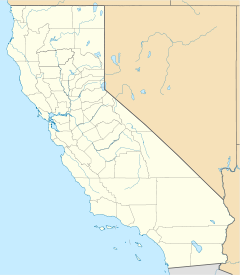Wasco station
|
Wasco
|
|||||||||||||||||||||||||||
|---|---|---|---|---|---|---|---|---|---|---|---|---|---|---|---|---|---|---|---|---|---|---|---|---|---|---|---|
| Amtrak inter-city rail station | |||||||||||||||||||||||||||
 |
|||||||||||||||||||||||||||
| Location | 700 G Street Wasco, California 93280 |
||||||||||||||||||||||||||
| Coordinates | 35°35′39″N 119°19′55″W / 35.5941°N 119.3319°WCoordinates: 35°35′39″N 119°19′55″W / 35.5941°N 119.3319°W | ||||||||||||||||||||||||||
| Owned by | City of Wasco | ||||||||||||||||||||||||||
| Line(s) | |||||||||||||||||||||||||||
| Platforms | 1 side platform | ||||||||||||||||||||||||||
| Tracks | 2 | ||||||||||||||||||||||||||
| Connections | Kern Regional Transit | ||||||||||||||||||||||||||
| Construction | |||||||||||||||||||||||||||
| Structure type | At-grade | ||||||||||||||||||||||||||
| Parking | free | ||||||||||||||||||||||||||
| Disabled access | Yes | ||||||||||||||||||||||||||
| Other information | |||||||||||||||||||||||||||
| Station code | WAC | ||||||||||||||||||||||||||
| History | |||||||||||||||||||||||||||
| Opened | September 21, 2006 | ||||||||||||||||||||||||||
| Traffic | |||||||||||||||||||||||||||
| Passengers (2013) | 49,245 |
||||||||||||||||||||||||||
| Services | |||||||||||||||||||||||||||
|
|||||||||||||||||||||||||||
| Location | |||||||||||||||||||||||||||
Wasco is an Amtrak station on the San Joaquin located in Wasco, California, United States. Free parking is available at the station, which has one platform on the west side of a single track. Of the 73 California stations served by Amtrak, this was the 49th-busiest in 2012, boarding or detraining an average of approximately 60 passengers daily.
Construction of the San Francisco and San Joaquin Valley Railroad (SF&SJ) had reached the location, which would become Wasco. The SF&SJ constructed a small, open-air, two story station. It cost $4,500 and followed their standard No. 2 design. There was also a large window, facing the tracks, for the station master to observe activity down the tracks. The town, named Dewey, would develop around the station. It would later be renamed Wasco.
In 1899, the SF&SJ would be purchased by the Atchison, Topeka and Santa Fe. They would continue to use the station for passenger and freight service. In 1907, the station was extended, to serve a growing demand for freight. In the 1950s, the waiting room was enclosed. The second floor was also reorganized as sleeping quarters.
The station closed in 1971, when Amtrak was formed. None of the routes in the San Joaquin Valley would continue to run. In 1974, the San Joaquin route would begin operating through the valley. Initially, the train would not stop in Wasco. The next year, it would become a flag stop. Despite having train service, in 1978, the train station was demolished. It was replaced with a couple of benches and a parking lot. Part of the train station would be used in the restoration of the Shafter Santa Fe Station.
At some point, Wasco became a regular stop for the San Joaquin route, and a shelter was built. In 2006, an entirely new station was constructed. It was designed as an open-air station, built in the Spanish Revival style. It would also house the Wasco Chamber of Commerce.
The station offers ticket sales through Amtrak's Quik-Trak self-serve ticketing kiosk; there are no staffed ticket agents. The station provides free parking. The waiting area is open air. There is only one side platform on the west side of a single track. The Wasco Chamber of Commerce office is located at the south wing of the building.
...
Wikipedia

